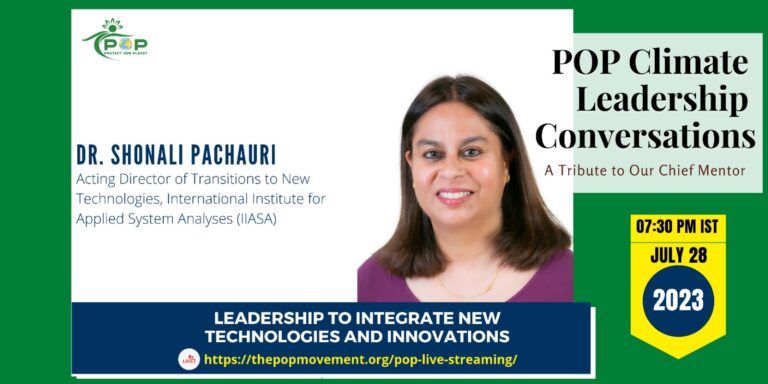
- This event has passed.
Leadership to integrate new technologies and innovations
July 28, 2023

During the 46th leadership conversation, Dr. Shonali Pachauri, Research Group Leader at IIASA, Austria, shared valuable insights on leadership. She emphasized the importance of inspiring and learning from others, highlighting qualities like integrity, empathy, and effective communication. Dr. Pachauri further emphasized building leadership among young people to protect the planet and all species for our collective survival.
In response to Drishya Pathak’s question about new innovations in energy and technology, Dr. Pachauri emphasized that innovation goes beyond technology and includes institutional aspects as well. She stressed the need to consider social structures, governance, and decarbonization to address today’s challenges effectively.
When asked by Dr. Norma Patricia Munoz Sevilla about the implementation of new technologies and innovations on a larger scale, Dr. Pachauri identified capacity and finance as major bottlenecks. Scaling up solutions becomes easier when these challenges are addressed, and she highlighted the importance of modular and accessible technologies for rural regions.
Philo Magdalene inquired about achieving universal access to decent living services, to which Dr. Pachauri emphasized that every human being has a right to a decent life and access to essential services. Redistribution of energy and commitment from governments, along with finance and capacity-building, are crucial for ensuring access to clean and essential services for all.
Ana Hanhausen sought advice for youth leaders interested in technology and innovation to tackle the climate crisis. Dr. Pachauri urged the youth to continue leading the way and emphasized the value of education in differentiating between real and false knowledge. She also highlighted the importance of inclusive innovation, learning from individuals with diverse experiences and perspectives.
In the concluding remarks by Dr. Saroj Pachauri, mutual learning and collaboration were emphasized. She emphasized the need for everyone to be involved in the collective efforts to address the climate crisis and stressed that every individual has a role to play in taking action.
Throughout the conversation, valuable insights were shared, and the importance of leadership, innovation, and inclusive approaches in tackling climate challenges became evident. Mutual learning and collaboration were highlighted as essential to achieving our collective goals.
About the guest speaker:
Dr. Shonali Pachauri is research group leader of the Transformative Institutional and Social Solutions Research Group, in the Energy, Climate, and Environment Program at the International Institute for Applied Systems Analysis (IIASA) in Austria. Prior to this, she served as acting director of the former Transitions to New Technologies Program and as senior research scholar in the former Energy Program at IIASA. She has also served as adjunct professor at the Yale School of Forestry and Environmental Studies. Pachauri’s research focuses on the role of social, institutional, and technological innovations for inclusive human development, particularly for those people without access to basic infrastructures and services. Her work explores pathways for achieving universal access to decent living energy services for human wellbeing and assessing the wider impacts of this for sustainable development.
She was a lead author for the Intergovernmental Panel on Climate Change (IPCC) Working Group III Sixth Assessment Report (AR6) and was coordinating lead author for the Global Energy Assessment (GEA). She serves on the science advisory panel for the Climate and Clean Air Coalition (CCAC) and on the advisory group for the International Network on Gender and Energy (ENERGIA). She is also on the editorial advisory boards for the journals Environmental Research Letters, Current Research in Environmental Sustainability, Economics of Energy & Environmental Policy, and Global Environmental Change. She holds a PhD from the Swiss Federal Institute of Technology, Zurich (ETHZ) and an MSc from University College London (UCL). She was recently recognized as one of the Best Social Sciences and Humanities Scientists in Austria.





